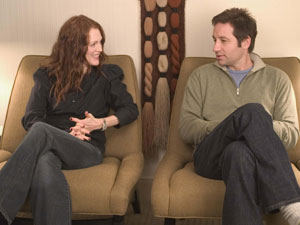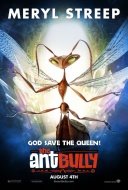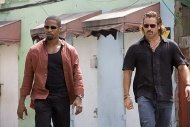
I'm off to our northern neighbor on Sunday, to attend the Montreal World Film Festival. For all the places I've been fortunate to visit, I've never been anywhere in Canada, and based on the doleful picture Spike Lee so convincingly paints of the US post-Katrina in his masterful documentary When the Levees Broke (which HBO re-airs in its entirety on Aug. 29, the first anniversary of the hurricane) I may just stay there until 2008, when the ballot boxes can be realigned in my favor. Chilling.
I've never covered a film festival of this breadth before--215 features, plus shorts and documentaries, many of them from local and overseas talent unfamiliar to me. The kindness of other visiting journalists might be of some use to sort it out, though I'll probably just go on instinct and interest level. But Lora says as I was "in training" last week, as I went from showing to screening, taking in no less than three films in six hours on Thursday. I'm the iron man of cinema.
Of course, there was no way I wasn't going to see Snakes on a Plane. Those prankish phone calls weren't for nothing. It pretty much met my expectations, if not New Line Cinema's where the boxoffice was concerned (there's just a ceiling on R-rated horror movie performance, no matter how excited the blogosphere is and how many calls Samuel L. Jackson makes on your behalf). As I said on the Mobius Home Video Forum:
"Saw it today and it surely delivers on its title, but there are plenty of missed opportunities as well...the snakes should have popped up (again!) in the cockpit during the landing, and it missed out, I think, by not "personalizing" the serpents--the big anaconda one (stretching credibility beyond its breaking point, how did they get HIM on the plane?) should have gone one-and-one with Jackson, the cobras should have ganged up for fraternal mischief, etc. We don't really get any sense of them as "characters," though some are quite pretty in their snaky way. I think it would taken more than a few spiked leis to rouse them, however; my impression is like most reptiles, they're often quite dozy, and if this scenario had really played out (as if, in the post 9/11 airline security world) I think the baggage handlers would have found them slumbering in the hold at journey's end.
I laughed when they flew out of the plane at the end. As funny were the R-rated scenes of inadvertent carnage, like the guy who gets the spike heel through his ear, as if the producers didn't want to fire up the workstations once more for snake action so instead turned to the makeup guys and said, "Guys, what can we do here for an effect?""
All I can add is, there better not be any mother----ing snakes on my mother----ing plane.
It occurs to me I never wrote anything about Little Miss Sunshine, which has gone into wider release. I liked the script, the cast, the sweet-and-sour mood...but it didn't really implant itself, and I'm not sure there's all that much more to say. It has a hard shell and a soft center, and goes down as easily, and as swiftly, as tartufo.
I also took in The Bridesmaid, the latest thriller from Claude Chabrol, and other adaptation of a novel by Ruth Rendell, a decade after the superb Le Ceremonie. "Thriller" might be too strong a word for these sinuous, carefully crafted tales; the new one ends with a jolt that is more satisfying emotionally than viscerally, cutting the movie off as surely as an oxygen mask might be severed in a snake-filled plane. It is, however, very meticulously shot (Eduardo Serra), scored (Matthieu Chabrol, his son; his films are rather a cottage industry for his relations, to judge from the credits), and acted, by the intriguingly aquiline Benoit Magimel as an interior designer and Laura Smet as a bridesmaid with designs on him. Coincidentally, my film watching group is taking in Chabrol's Le Boucher (1969) tomorrow evening, as the director continues to ride the French New Wave he helped initiate.
As coincidentally, I went to a screening of Le Petit Lieutenant, a fine French policier starring Smet's mother, the veteran actress Nathalie Baye, in a Cesar-winning turn as an alcoholic police captain and Jalil Lespert (from Laurent Cantet's Human Resources) as her squad's latest recruit. Directed by Xavier Beauvois, the movie (opening Sept. 8) will be a sure-fire hit with anyone who enjoys the British TV drama Prime Suspect, if its distributor, Cinema Guild, puts a few marketing dollars behind it. Baye, whose long career ranges from Day for Night to Catch Me If You Can (as Leonardo DiCaprio's mother), is better-equipped to talk about it than I can, and she did, with my colleague Richard Porton at Cineaste.
It's probably too early, impolitic, or ahead-of-the-curve to talk about the three fall releases I saw, Running with Scissors, Infamous, and Candy. So I won't. Except to say that when movies about dysfunctional families, tormented writers, and drug abuse arrive, the fall prestige-and-awards season has begun, and it may all be enough to make us miss summer superheroes.
To be continued...but first, the late-breaking addition of theater reviews of Mother Courage and Her Children and Martin Short: Fame Becomes Me, from the Live Design magazine website.










